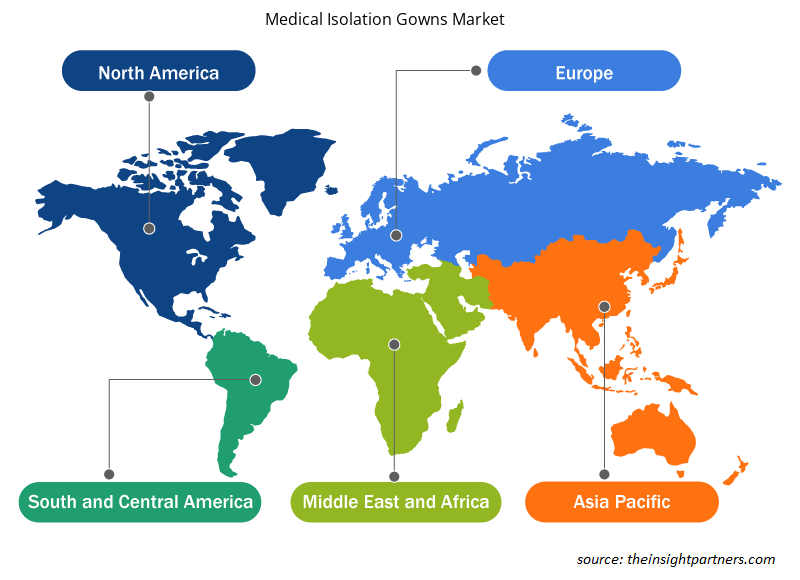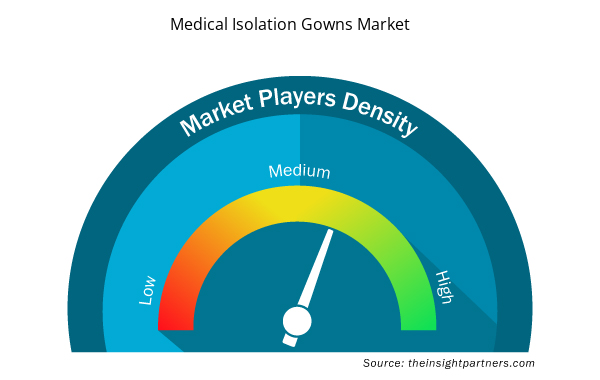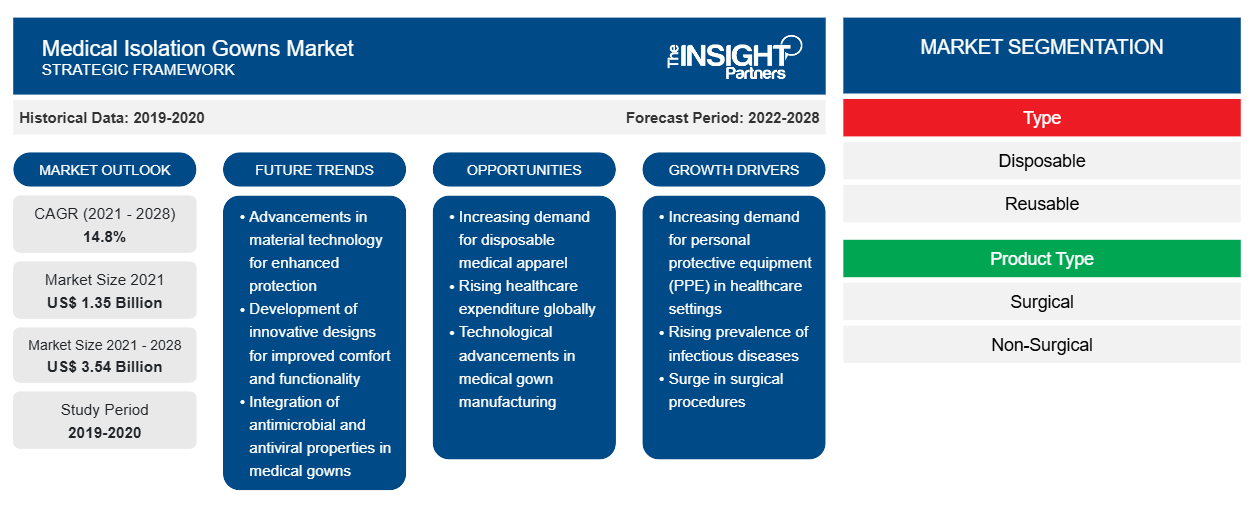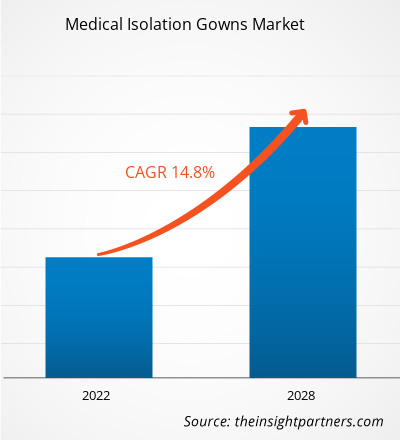Der Markt für medizinische Isolationskittel soll von 1.346,31 Millionen US-Dollar im Jahr 2021 auf 3.542,78 Millionen US-Dollar im Jahr 2028 anwachsen; von 2021 bis 2028 wird mit einer durchschnittlichen jährlichen Wachstumsrate von 14,8 % gerechnet.
Der Bericht bietet Einblicke und eine eingehende Analyse des Marktes für medizinische Isolationskittel und legt dabei den Schwerpunkt auf verschiedene Parameter wie Markttrends und -chancen, Marktdynamik und Wettbewerbslandschaftsanalyse führender Marktteilnehmer in Nordamerika, Europa, im asiatisch-pazifischen Raum, in Süd- und Mittelamerika sowie im Nahen Osten und Afrika. Er enthält auch die Auswirkungsanalyse der COVID-19-Pandemie auf die Regionen.
Passen Sie diesen Bericht Ihren Anforderungen an
Sie erhalten kostenlos individuelle Anpassungen an jedem Bericht, einschließlich Teilen dieses Berichts oder einer Analyse auf Länderebene, eines Excel-Datenpakets sowie tolle Angebote und Rabatte für Start-ups und Universitäten.
- Holen Sie sich die wichtigsten Markttrends aus diesem Bericht.Dieses KOSTENLOSE Beispiel umfasst eine Datenanalyse von Markttrends bis hin zu Schätzungen und Prognosen.
Markteinblicke
Sensibilisierung für im Krankenhaus erworbene Infektionen
Patienten ziehen sich im Krankenhaus oder in einer anderen Gesundheitseinrichtung Krankenhausinfektionen oder im Rahmen der medizinischen Versorgung erworbene nosokomial erworbene Infektionen (HAI) zu. Diese Infektionen werden durch gängige Krankheitserreger wie Bakterien, Viren, Pilze und Parasiten verursacht. Zu den HAI zählen katheterbedingte Harnwegsinfektionen, Wundinfektionen (SSI), zentralvenöse Venenkatheter-assoziierte Blutbahninfektionen, beatmungsassoziierte Pneumonie, im Krankenhaus erworbene Pneumonie und verschiedene andere Infektionen. Auch viele chirurgische Geräte können HAI-Verbreiter sein.
HAIs weisen eine hohe Morbiditäts- und Mortalitätsrate auf und kosten das Gesundheitssystem jedes Jahr Milliarden von Dollar. Die Centers for Disease Control (CDC) berichteten, dass HAIs jedes Jahr für etwa 1,7 Millionen Infektionsfälle und 99.000 Todesfälle in amerikanischen Krankenhäusern verantwortlich sind. Bei allen medizinischen Eingriffen in Gesundheitseinrichtungen ist das Tragen von Isolationskitteln vorgeschrieben. Sie helfen, Kreuzkontaminationen, die Übertragung von Körperflüssigkeiten und infektionserregenden Mikroorganismen sowie das Eindringen von Flüssigkeiten zu verhindern. Regierungsbehörden wie das National Healthcare Safety Network (NHSN) des Center for Disease Control and Prevention (CDC) überwachen die Infektionen genau, um HAI zu verhindern und die Patientensicherheit zu erhöhen. In den USA arbeitet das Department of Health and Human Services (HHS) daran, HAI-Fälle zu reduzieren. Darüber hinaus überwacht in Europa das Healthcare-Associated Infections Surveillance Network (HAI-Net) diese Infektionen in der Region, und die Funktion des HAI-NET wird vom Europäischen Zentrum für die Prävention und Kontrolle von Krankheiten (ECDC) verwaltet und kontrolliert. Eine Umfrage mit dem Titel „Bewusstsein für HAIs unter Medizinstudenten in einem Zentrum der tertiären Versorgung“ ergab beispielsweise, dass insgesamt 82 % (von 250) der Studenten über HAIs informiert waren.
Typbasierte Erkenntnisse
Der Markt für medizinische Isolationskittel ist je nach Typ in Einweg- und Mehrwegkittel unterteilt. Das Einwegsegment hatte 2021 einen größeren Marktanteil. Es wird jedoch geschätzt, dass das Mehrwegsegment im Prognosezeitraum eine höhere durchschnittliche jährliche Wachstumsrate (CAGR) von 15,5 % auf dem Markt verzeichnen wird.
Produkttypbasierte Einblicke
Basierend auf dem Produkttyp ist der Markt für medizinische Isolationskittel in chirurgische und nicht-chirurgische unterteilt. Das chirurgische Segment hielt im Jahr 2021 einen größeren Marktanteil. Es wird jedoch geschätzt, dass das nicht-chirurgische Segment im Prognosezeitraum eine höhere durchschnittliche jährliche Wachstumsrate (CAGR) von 15,1 % verzeichnet.
Anorganische Strategien wie Fusionen und Übernahmen werden häufig von Unternehmen eingesetzt, um den sich ändernden Kundenanforderungen gerecht zu werden und ihre Markennamen weltweit zu behaupten. Akteure auf dem Markt für medizinische Isolationskittel setzen auch organische Strategien wie Produkteinführung und -erweiterung ein, um ihre Präsenz und ihr Produktportfolio weltweit auszuweiten und die wachsende Nachfrage zu befriedigen.
Regionale Einblicke in den Markt für medizinische Isolationskittel
Die regionalen Trends und Faktoren, die den Markt für medizinische Isolationskittel während des Prognosezeitraums beeinflussen, wurden von den Analysten von Insight Partners ausführlich erläutert. In diesem Abschnitt werden auch die Marktsegmente und die Geografie für medizinische Isolationskittel in Nordamerika, Europa, im asiatisch-pazifischen Raum, im Nahen Osten und Afrika sowie in Süd- und Mittelamerika erörtert.

- Erhalten Sie regionale Daten zum Markt für medizinische Isolationskittel
Umfang des Marktberichts zu medizinischen Isolationskitteln
| Berichtsattribut | Details |
|---|---|
| Marktgröße im Jahr 2021 | 1,35 Milliarden US-Dollar |
| Marktgröße bis 2028 | 3,54 Milliarden US-Dollar |
| Globale CAGR (2021 - 2028) | 14,8 % |
| Historische Daten | 2019-2020 |
| Prognosezeitraum | 2022–2028 |
| Abgedeckte Segmente | Nach Typ
|
| Abgedeckte Regionen und Länder | Nordamerika
|
| Marktführer und wichtige Unternehmensprofile |
|
Dichte der Marktteilnehmer für medizinische Isolationskittel: Die Auswirkungen auf die Geschäftsdynamik verstehen
Der Markt für medizinische Isolationskittel wächst rasant, angetrieben durch die steigende Nachfrage der Endnutzer aufgrund von Faktoren wie sich entwickelnden Verbraucherpräferenzen, technologischen Fortschritten und einem größeren Bewusstsein für die Vorteile des Produkts. Mit steigender Nachfrage erweitern Unternehmen ihr Angebot, entwickeln Innovationen, um die Bedürfnisse der Verbraucher zu erfüllen, und nutzen neue Trends, was das Marktwachstum weiter ankurbelt.
Die Marktteilnehmerdichte bezieht sich auf die Verteilung der Firmen oder Unternehmen, die in einem bestimmten Markt oder einer bestimmten Branche tätig sind. Sie gibt an, wie viele Wettbewerber (Marktteilnehmer) in einem bestimmten Marktraum im Verhältnis zu seiner Größe oder seinem gesamten Marktwert präsent sind.
Die wichtigsten auf dem Markt für medizinische Isolationskittel tätigen Unternehmen sind:
- Cardinal Health, Inc.
- Medline Industries, Inc.
- Leboo Healthcare Produkte GmbH
- Narang Medical GmbH
- Shanghai Medical Corporation
Haftungsausschluss : Die oben aufgeführten Unternehmen sind nicht in einer bestimmten Reihenfolge aufgeführt.

- Überblick über die wichtigsten Akteure auf dem Markt für medizinische Isolationskittel
Nach Typ
- Einweg
- Wiederverwendbar
Nach Produkttyp
- Chirurgisch
- Nicht-chirurgisch
Nach Endbenutzer
- Krankenhäuser
- Ambulante Chirurgische Zentren
- Kliniken
- Sonstiges
Nach Geografie
- Nordamerika
- UNS
- Kanada
- Mexiko
- Europa
- Serbien
- Vereinigtes Königreich
- Russland
- Polen
- Estland
- Litauen
- Schweden
- Slowakei
- Finnland
- Deutschland
- Frankreich
- Italien
- Spanien
- Restliches Europa
- Asien-Pazifik
- China
- Japan
- Indien
- Australien
- Südkorea
- Restlicher Asien-Pazifik-Raum
- Naher Osten und Afrika
- Vereinigte Arabische Emirate
- Saudi-Arabien
- Afrika
- Restlicher Naher Osten und Afrika
- Süd- und Mittelamerika
- Brasilien
- Argentinien
- Restliches Süd- und Mittelamerika
Firmenprofile
- Historische Analyse (2 Jahre), Basisjahr, Prognose (7 Jahre) mit CAGR
- PEST- und SWOT-Analyse
- Marktgröße Wert/Volumen – Global, Regional, Land
- Branche und Wettbewerbsumfeld
- Excel-Datensatz



Report Coverage
Revenue forecast, Company Analysis, Industry landscape, Growth factors, and Trends

Segment Covered
This text is related
to segments covered.

Regional Scope
North America, Europe, Asia Pacific, Middle East & Africa, South & Central America

Country Scope
This text is related
to country scope.
Häufig gestellte Fragen
The market is estimated to grow with a CAGR of 14.9% from 2021 to 2028.
Cardinal Health, Inc.; Medline Industries, Inc.; Leboo Healthcare Products Limited; Shanghai Medical Corporation; Mölnlycke Health Care AB; Advin Healthcare; Dispotech SRL; CWS International GmbH; Elis SA (Elis); and Alsco, Inc. are among the leading companies operating in the high throughput screening market.
Key factors that are driving growth of the market are increasing awareness regarding hospital-acquired infections and increase in number of emergency procedures in the medical isolation gowns market fuel the growth of the market.
Isolation gowns are a kind of personal protective equipment used in health care facilities. They are designed to help protect the front-line caregivers and other personnel from infectious droplets, fluid penetration, and solid materials and prevent the transmission of micro-organisms to people with weak immune systems. Medical gowns are a part of the infection-control strategy. The medical isolation gowns are categorized into four levels, such as level 1, level 2, level 3, and level 4. Level 1 gown is to be used during minimal risk conditions, level 2 gowns for low risk, level 3 gowns during moderate risk such as in the Emergency Room or for trauma cases, and level 4 gowns during high-risk conditions where pathogen resistance is required.
Trends and growth analysis reports related to Life Sciences : READ MORE..
The Insight Partners performs research in 4 major stages: Data Collection & Secondary Research, Primary Research, Data Analysis and Data Triangulation & Final Review.
- Data Collection and Secondary Research:
As a market research and consulting firm operating from a decade, we have published and advised several client across the globe. First step for any study will start with an assessment of currently available data and insights from existing reports. Further, historical and current market information is collected from Investor Presentations, Annual Reports, SEC Filings, etc., and other information related to company’s performance and market positioning are gathered from Paid Databases (Factiva, Hoovers, and Reuters) and various other publications available in public domain.
Several associations trade associates, technical forums, institutes, societies and organization are accessed to gain technical as well as market related insights through their publications such as research papers, blogs and press releases related to the studies are referred to get cues about the market. Further, white papers, journals, magazines, and other news articles published in last 3 years are scrutinized and analyzed to understand the current market trends.
- Primary Research:
The primarily interview analysis comprise of data obtained from industry participants interview and answers to survey questions gathered by in-house primary team.
For primary research, interviews are conducted with industry experts/CEOs/Marketing Managers/VPs/Subject Matter Experts from both demand and supply side to get a 360-degree view of the market. The primary team conducts several interviews based on the complexity of the markets to understand the various market trends and dynamics which makes research more credible and precise.
A typical research interview fulfils the following functions:
- Provides first-hand information on the market size, market trends, growth trends, competitive landscape, and outlook
- Validates and strengthens in-house secondary research findings
- Develops the analysis team’s expertise and market understanding
Primary research involves email interactions and telephone interviews for each market, category, segment, and sub-segment across geographies. The participants who typically take part in such a process include, but are not limited to:
- Industry participants: VPs, business development managers, market intelligence managers and national sales managers
- Outside experts: Valuation experts, research analysts and key opinion leaders specializing in the electronics and semiconductor industry.
Below is the breakup of our primary respondents by company, designation, and region:

Once we receive the confirmation from primary research sources or primary respondents, we finalize the base year market estimation and forecast the data as per the macroeconomic and microeconomic factors assessed during data collection.
- Data Analysis:
Once data is validated through both secondary as well as primary respondents, we finalize the market estimations by hypothesis formulation and factor analysis at regional and country level.
- Macro-Economic Factor Analysis:
We analyse macroeconomic indicators such the gross domestic product (GDP), increase in the demand for goods and services across industries, technological advancement, regional economic growth, governmental policies, the influence of COVID-19, PEST analysis, and other aspects. This analysis aids in setting benchmarks for various nations/regions and approximating market splits. Additionally, the general trend of the aforementioned components aid in determining the market's development possibilities.
- Country Level Data:
Various factors that are especially aligned to the country are taken into account to determine the market size for a certain area and country, including the presence of vendors, such as headquarters and offices, the country's GDP, demand patterns, and industry growth. To comprehend the market dynamics for the nation, a number of growth variables, inhibitors, application areas, and current market trends are researched. The aforementioned elements aid in determining the country's overall market's growth potential.
- Company Profile:
The “Table of Contents” is formulated by listing and analyzing more than 25 - 30 companies operating in the market ecosystem across geographies. However, we profile only 10 companies as a standard practice in our syndicate reports. These 10 companies comprise leading, emerging, and regional players. Nonetheless, our analysis is not restricted to the 10 listed companies, we also analyze other companies present in the market to develop a holistic view and understand the prevailing trends. The “Company Profiles” section in the report covers key facts, business description, products & services, financial information, SWOT analysis, and key developments. The financial information presented is extracted from the annual reports and official documents of the publicly listed companies. Upon collecting the information for the sections of respective companies, we verify them via various primary sources and then compile the data in respective company profiles. The company level information helps us in deriving the base number as well as in forecasting the market size.
- Developing Base Number:
Aggregation of sales statistics (2020-2022) and macro-economic factor, and other secondary and primary research insights are utilized to arrive at base number and related market shares for 2022. The data gaps are identified in this step and relevant market data is analyzed, collected from paid primary interviews or databases. On finalizing the base year market size, forecasts are developed on the basis of macro-economic, industry and market growth factors and company level analysis.
- Data Triangulation and Final Review:
The market findings and base year market size calculations are validated from supply as well as demand side. Demand side validations are based on macro-economic factor analysis and benchmarks for respective regions and countries. In case of supply side validations, revenues of major companies are estimated (in case not available) based on industry benchmark, approximate number of employees, product portfolio, and primary interviews revenues are gathered. Further revenue from target product/service segment is assessed to avoid overshooting of market statistics. In case of heavy deviations between supply and demand side values, all thes steps are repeated to achieve synchronization.
We follow an iterative model, wherein we share our research findings with Subject Matter Experts (SME’s) and Key Opinion Leaders (KOLs) until consensus view of the market is not formulated – this model negates any drastic deviation in the opinions of experts. Only validated and universally acceptable research findings are quoted in our reports.
We have important check points that we use to validate our research findings – which we call – data triangulation, where we validate the information, we generate from secondary sources with primary interviews and then we re-validate with our internal data bases and Subject matter experts. This comprehensive model enables us to deliver high quality, reliable data in shortest possible time.


 Holen Sie sich ein kostenloses Muster für diesen Bericht
Holen Sie sich ein kostenloses Muster für diesen Bericht